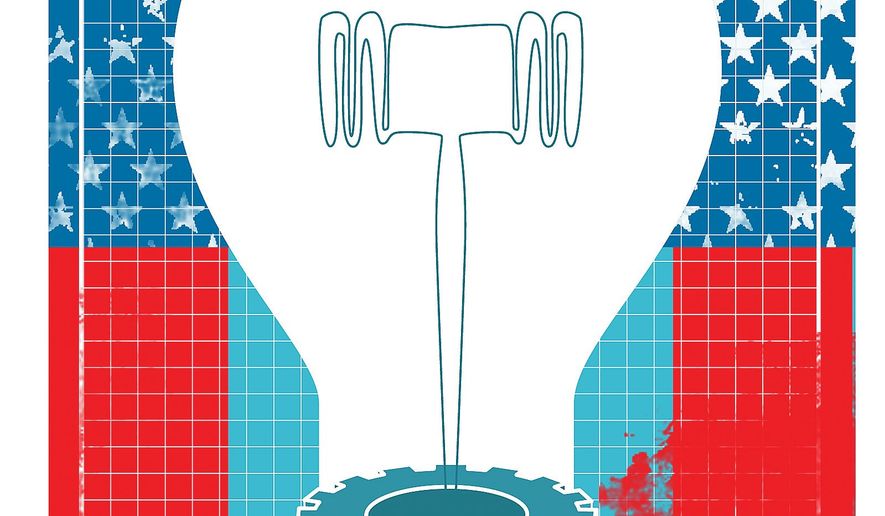ANALYSIS/OPINION:
On Monday, the Supreme Court will hear oral arguments in the case Oil States Energy Services LLC v. Greene’s Energy Group LLC. The case will decide the constitutionality of a little-known government agency called the Patent and Trial Appeals Board. Even more significantly, the case will have far-reaching implications for intellectual property rights, patent protections and the future of innovation in the United States.
The Patent and Trial Appeals Board (PTAB), an administrative tribunal headed up by the U.S. Patent and Trademark Office, was established in 2012 as a result of the America Invents Act. PTAB’s intended purpose was to more efficiently review and rule on patents to determine if the underlying inventions were distinct enough from other inventions to warrant a new patent.
At the time when Congress voted on the America Invents Act in 2011, PTAB appeared to be a good idea and an effective way of combatting “patent trolls.” In practice, however, the administrative law body has become a roadblock in America’s innovative sector, creating new hurdles for inventors, and driving higher costs in innovation. The agency has simultaneously undermined the U.S. Constitution, our system of separation of powers, and one of the most important features of our nation’s innovative economy - patent protections.
Throughout U.S. history, intellectual property has enjoyed high esteem and protections on par with those of physical property. Patents, which define ownership of ideas and creations the way deeds define ownership of physical property, have been enforced and upheld in the United States for more than two centuries.
The United States’ strong defense of intellectual property dates back to the Constitution and the Founding Fathers. Article I, Section 8 of the Constitution, aptly referred to as the “patent and copyright clause,” gives Congress the power “to promote the progress of science and useful arts, by securing for limited times to authors and inventors the exclusive right to their respective writings and discoveries.”
James Madison, an ardent defender of intellectual property rights, explained that property, in a strict sense, relates to an individual’s “land, or merchandise, or money,” but in a broader sense, the term “property” also equally applies to an individual’s “opinions and the free communication of them.”
Historian and former Harvard professor Richard Pipes has noted that in 17th and 18th century Western thought, the view of property expanded to include not simply land and material wealth, but “everything that one could claim as one’s own, including life and liberty.” That Madison should connect property rights to the individual’s foundational rights to life and liberty is quite instructive.
Our nation’s founders understood that property is closely linked to freedom and the rule of law. A society committed to property rights will, of necessity, devote itself to the rule of law and other safeguards protecting liberty.
During PTAB’s five-year history, the agency has unwittingly made the case that property protections are, indeed, inextricably linked to other essential protections of liberty. In chipping away at patent protections (read: fundamental property rights), PTAB has also degraded two other institutions of paramount importance to our American system of limited government - the Constitution’s carefully prescribed separation of powers, and due process.
In the first instance, PTAB, which resides in the executive branch of government, has rapidly usurped the powers and authority reserved for the judicial branch. As we have seen elsewhere with unaccountable and out-of-control executive boards and agencies, PTAB has encroached upon the other government branches’ authority - in this case, seizing for itself the judiciary branch’s purview when it comes to patent reviews.
Perhaps most frightening is the way PTAB has eroded due process. PTAB operates outside of the Constitution and allows patent challenges from nearly anyone, which means patent-holders are forced to constantly play defense to protect their property. Cases are decided by judges installed by the Commerce Department, without the assistance of juries.
PTAB invalidates so many patents that the agency today functions as a “patent death-squad,” a term coined by Randall Rader, the former chief judge of the U.S. Court of Appeals for the Federal Circuit.
Sound like a dangerous and untenable framework for small businesses and individual inventors? It is.
Americans are fortunate to live in a country that has, with great effort and thoughtful deliberation, sought to develop the conditions and environment most likely to foster innovation. Our patent protection system, deeply rooted in our country’s overall strong defense of private property rights, fuels and incentivizes the innovation and entrepreneurship that are the envy of the rest of the world.
The Supreme Court justices, as they listen to oral arguments in this case next week, would do well to reflect on the many ways PTAB has turned our property-rights paradigm upside down, inverting many of the core principles upon which our nation was founded.




Please read our comment policy before commenting.